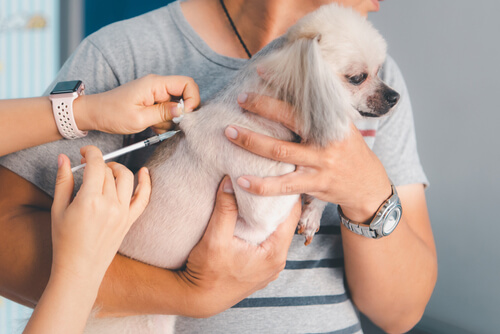Bordetella (Kennel Cough) – This is a non-core vaccine, and your veterinarian might not consider your pet to be at risk. The vaccine is first given to puppies when they are 8 weeks old and is repeated every 6 to 12 months depending on the dog’s exposure.
Influenza -This is a non-core vaccine. We offer the bivalent h3n2 h3n8 influenza vaccine.
Distemper, Hepatitis, Parainfluenza, Parvovirus (DHPP) – These vaccines are considered core vaccines. Your puppy will receive their first vaccination between 6 and 8 weeks old, and booster shots will be given once every 3 weeks until your puppy is 15 to 18 weeks old (depending on when vaccinations were started). A booster vaccination is administered after the first year and every third year following that.
Heartworm – Heartworm prevention is considered a core treatment and is given to a puppy/dog monthly for the extent of their life. Usually a routine Heartworm test is performed at 6 months or older and then annually. If heartworm is detected, treatment is implemented.
Leptospirosis – This core vaccine can be given to a puppy at 8 weeks of age or older and a booster vaccine in 3 weeks. The vaccine is given annually thereafter. The vaccine is intended to prevent bacterial infections in the kidneys, liver, and other major organs.
Lyme – The Lyme vaccination is a non-core vaccine that is first administered when the puppy reaches 12 weeks old. The first booster is given to the puppy at 15 weeks old, and annual boosters are recommended for dogs that reside in areas with increased exposure to ticks carrying Lyme disease.
Rabies – The rabies vaccine is considered a core vaccine, and many states require pets to have it by law, but there are a few exceptions. The initial vaccine is first given when the puppy reaches 16 weeks old. A booster shot is necessary after 1 year, then typically every 3rd year following that.


